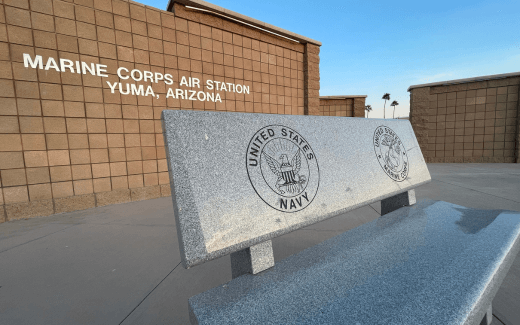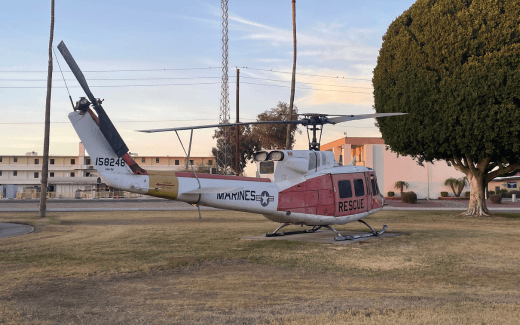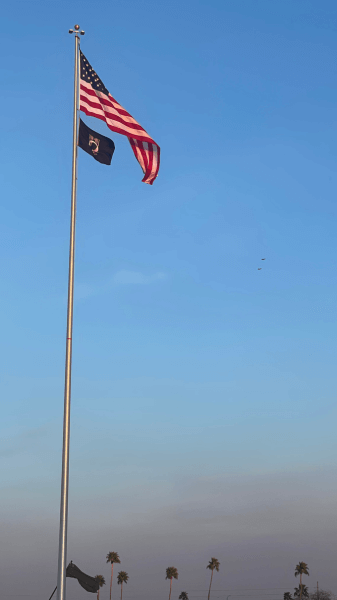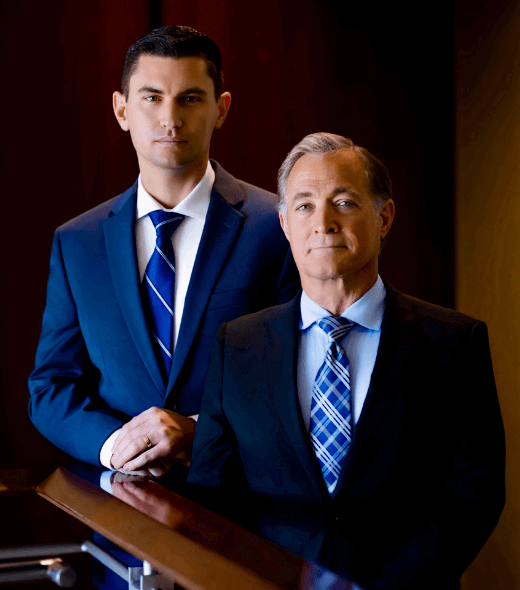MCAS Yuma Military Attorneys
Defending Service Members Worldwide Since 1987.
Yuma military attorneys from the Military Law Center defend active duty and reserve Marines and Sailors stationed aboard Marine Corps Air Station Yuma at courts-martial, administrative separation hearings, and provide legal advice for other employment matters such as non-judicial punishments and correcting military records. Our military defense attorneys provide critically needed legal advice to service members in Yuma, AZ accused of crimes under the Uniform Code of Military Justice.
About Military Justice
The military justice system at MCAS Yuma is complex and different from the civilian criminal system used in Arizona. It requires a deep understanding of military laws and regulations. Most importantly, it demands an experienced litigator to stand up to a Marine Corps command and unrelenting prosecutor.
Located in the Sonoran Desert, MCAS Yuma is the Marine Corps’ premier aviation training installation with about 4,000 active duty Marines and Sailors. With Yuma being the “Sunniest City in the World,” the weather is ideal for aviators. MCAS Yuma hosts 70 aviation units throughout the year. The following units are based at MCAS Yuma: Marine Aviation Weapons and Tactics Squadron 1 (MAWTS-1), Marine Operational Test and Evaluation Squadron 1 (VMX-1), Marine Aircraft Group 13 (MAG-13), Marine Air Control Squadron 1 (MACS-1), Marine Fighter Training Squadron 401 (VMFT-401), and Combat Logistics Company 16 (CLC-16).
The military attorneys at the Military Law Center are Marine veterans who served and litigated cases throughout the Marine Corps. They know Marines, what it means to serve, and they know the military commands. When your career and reputation have been tarnished by an accusation, our Yuma military attorneys will defend your legal rights.
Investigations aboard MCAS Yuma
Our military defense attorneys advise Marines and Sailors during the investigation phase of their case. It could be a law enforcement investigation into sexual assault or domestic violence, or it may be a command investigation into drug use or driving under the influence. Unfortunately, due to Marine Corps policies, most Marines and Sailors will not receive a detailed military defense counsel (JAG) during the investigation stage. Most often, a judge advocate will begin representing them when the government prefers courts-martial charges or notifies a service member of administrative separation. Regardless of the UCMJ offense, Marines and Sailors can retain the attorneys at the Military Law Center while they are under investigation.
Courts-Martial Attorneys Near MCAS Yuma
Marines and Sailors stationed at MCAS Yuma accused of criminal offenses may discover their case is referred to a court-martial. After the investigation, a Marine Corps prosecutor will review the evidence and prefer charges against an accused. For serious felony level allegations such as murder, rape, and sexual assault, the Yuma Office of the Special Trial Counsel will try the case at a General Court-Martial. These Marine Judge Advocates are specially trained litigators with experience trying high-profile sexual assault cases. Marines and Sailors accused of serious allegations should retain experienced civilian defense attorneys to ensure their rights are protected. If the Marine Corps is allocating its best and brightest lawyers to take an accused’s freedoms away, the service member should retain the best military defense attorneys they can afford.
For Yuma courts-martial cases that do not require felony level attention, military commands will often refer charges to a special court-martial. Cases like drug use, false official statements, unauthorized absence, and general orders violations may be handled at Yuma’s courtroom. A special court-martial conviction can still cause a service member to be punitively separated with a bad conduct discharge. A bad conduct discharge can cost a service member hundreds of thousands of dollars in veterans benefits. So, working with the Military Law Center’s attorneys to avoid a federal conviction is in their best interest.
Table of Contents:
Get Help Now
Call us Today at (760) 536-9038 or complete the below form for a free, no obligation initial consultation.
Phases of a Miramar Court Martial
- Allegation is Made
- Investigation
- Preferral of Charges
- Article 32 Hearing
- Case Referred to Court-Martial
- Arraignment
- Discovery
- Written Motions Filed
- Motions Argued at Article 39
- Final Pre-Trial Matters Filed
- Trial Begins with Jury Selection (Voir Dire)
- Opening Statements
- Witnesses and Evidence Presented
- Closing Arguments
- Verdict

Administrative Separations
Enlisted Marines and Sailors near Yuma accused of misconduct may be notified for administrative separation and will need the help of experienced military defense attorneys. After an investigation, a command may choose to notify the service member with the specific allegation for which they may be separated. The MARCORSEPMAN is the legal authority used for Marines and the MILPERSMAN is the authority for Sailors. When this occurs, the service member will get an opportunity to review the documentary evidence and prepare a defense with their attorney. In addition to presenting contradictory documentary evidence, the service member and their defense team will be able to call witnesses, cross examine government witnesses, make an opening statement, and provide a closing argument.
Phases of an ADSEP Board at MCAS Yuma
- Allegation is Made
- Investigation
- Command Issues Written Counseling
- Marine or Sailor Notified of Separation Proceedings
- Member Selection (Voir Dire)
- Opening Statements
- Documentary Evidence Presentation
- Testimony from Fact and Character Witnesses
- Closing Arguments
- Board Decision is Announced

Three Questions at an ADSEP Board

Basis?
This question asks whether there is enough evidence to prove the allegation in the notification.

Retention or Separation?
If basis is met, the members must decide whether to retain or separate the Marine or Sailor.

Characterization of Service?
If separation is recommended, the members must characterize the enlistment as either honorable, general (under honorable conditions), or other than honorable.
While the administrative separation board proceeding is supposed to be about determining if the service member is suitable for continued service in the Marine Corps or Navy, it has life long potential consequences.
- The Marine or Sailor’s job, healthcare, and salary are at risk.
- If separated, the board members will recommend a characterization of service: honorable, general (under honorable conditions), and other than honorable (OTH). For service members without a previous honorable enlistment, this means they could lose the GI Bill, VA home loan, VA healthcare, and disability payments.
- Immigration consequences exist for service members who naturalized less than five years ago.
Civilian military defense attorneys from the Military Law Center are available to help guide, advocate, and defend Marines and Sailors facing administrative separation.
Boards of Inquiry
Officers aboard Marine Corps Air Station Yuma in need of a defense attorney for a Board of Inquiry (BOI) need to look no further than the Military Law Center. As former Marine Officers themselves, the attorneys have gone through Officer Candidate School, The Basic School, and know the incredible demands the Marine Corps places on its junior and senior officers.
A Board of Inquiry at MCAS Yuma starts with an allegation. Once an allegation of misconduct is made against an officer, the command reports it within 24 hours to either Judge Advocate Division’s section on officer misconduct or Navy Personnel Command. The allegation is documented in the Officer Disciplinary Notebook (ODN) aka the Black Book. That entry is permanent, and it triggers the first general officer in the officer’s chain of command to investigate.
When a general officer reviews the completed investigation, they determine one of five options:
- No Misconduct Occurred, generate a Report of No Misconduct.
- Misconduct Occurred, Address Misconduct Administratively with a NPLOC or informal counseling.
- Misconduct Occurred, Document with IRAM 3005 Counseling.
- Misconduct Occurred, Notify Officer of Intent to NJP.
- Misconduct Occurred, Prefer Charges at Court-Martial.
Depending on how the accused Officer chooses to proceed, the command may determine a Board of Inquiry is required. In that case, for most Yuma Marine Officers, the Show Cause Authority (SCA) will be the three-star commanding general for I Marine Expeditionary Force. As the SCA, the Commanding General may convene a BOI or direct subordinate commands order the officer to show cause at a board of inquiry. When this happens, the subordinate commands will notify the Marine Officer of the alleged misconduct and typically include as an additional basis substandard performance or professional dereliction.
Probationary officers, those commissioned officers who have served less than six years and warrant officers with less than three years of time as an officer, are not entitled to a hearing. Instead, the command may proceed with notification procedures and may separate the officer with an honorable or general (under honorable conditions). In this case, the officer is entitled to submit written matters to be considered by the Secretary of the Navy.
The SECNAVINST 1920.6_ series governs the BOI procedures, composition, and rights of the officer at the hearing. The board will have three senior officers, and they are tasked with determining if the Officer is suitable for continued naval service. To do this, they must answer:
- Is there Basis?
This means: is there enough evidence to support the allegation of misconduct, substandard performance, or dereliction of duty? - Retention or Separation.
If basis is met, the members will determine if the officer has potential for future honorable naval service. If yes, they will vote to retain. If no, they will vote to separate. - Characterization of Service.
If separation is required, the members with recommend a characterization of service: honorable, general (under honorable conditions), or other than honorable (OTH).
An officer may present documentary, audio, and video evidence, in addition to calling fact and character witnesses. At MCAS Yuma, military attorneys retained by the Officer will ask questions of the members during voir dire, deliver an opening statement, cross examine government witnesses, direct witnesses called by the respondent, and give a closing argument.
As the Board of Inquiry has life changing consequences, it is essential to retain the best legal representation an officer stationed at MCAS Yuma can afford. Even more importantly, it is best to get representation from the start because officers are unlikely to be provided a detailed military attorney until approximately 30 days before their hearing. The defense attorneys from the Military Law Center are ready to build a strategy today.



Non-Judicial Punishments
Minor misconduct occurring at or near MCAS Yuma may be handled through non-judicial punishment. For many Marines and Sailors, an Article 15 hearing may be the precursor to an administrative separation board. For misconduct related to drug abuse, civilian convictions, or sexual misconduct, an administrative separation board is required. So, it is important to ensure the long-term strategy includes carefully deciding whether to accept non-judicial punishment or not.
When an incident occurs, a commanding officer may offer non-judicial punishment as a forum to their Marine or Sailor. The service member then must answer the question: accept or deny the forum of NJP? If they accept NJP, the service member must then decide whether to plead not guilty or guilty. That’s right – Marines and Sailors can accept NJP and plead not guilty at the hearing. They are also allowed to bring documentary evidence and fact witnesses to defeat the allegation.
When a service member at Yuma denies the forum of NJP, then the command may choose to: do nothing, issue a negative counseling, notify the service member for administrative separation, or prefer court-martial charges.
Any service member found guilty at NJP may appeal the NJP within five days to the next higher command. To succeed on an NJP appeal, the service member must show a legal error, the punishment was unjust, or the punishment was disproportionate to the offense committed.
Board for Correction of Naval Records
Marines and Sailors stationed aboard MCAS Yuma may find their military record needs to be fixed. They may need to correct an award, pull a Fitness Report, appeal the results of an administrative separation board or board of inquiry, or to fix any legal error or injustice.
To do so, service members must petition the Board for Correction of Naval Records (BCNR) by filing DD Form 149. When doing so, service members need to identify a legal error or injustice. The Yuma military attorneys from the Military Law Center can assist with preparing the BCNR petition.

Why Hire a Civilian Attorney?
Hiring a civilian attorney for Yuma related military legal matters is about retaining experienced, competent, and compassionate attorneys. Yuma military attorneys from the Military Law Center are well versed in military justice matters. They served as Judge Advocates (JAG) and handled legal hearings aboard Yuma while on active duty. They continue to defend clients at MCAS Yuma, MCAS Miramar, MCB Camp Pendleton, around San Diego, and installations around the world. As privately retained attorneys, they do not report to anyone within the military. Additionally, they are not distracted by requirements like standing duty, shooting at the rifle range, and attending annual training or weekly PMEs. Importantly, they are available to provide legal advice and can join your defense team today.
Unfortunately for many Marines and Sailors aboard MCAS Yuma, when they face legal issues during a criminal or command investigation, they are not assigned a free military counsel because it is too early in the process. The detailed military lawyers at the Yuma DSO are prevented from representing them until they are formally detailed to the case. That often requires preferred charges or a notification for separation.
So, while the Marine Corps commands get advice from the Office of the Staff Judge Advocate and Office of the Special Trial Counsel at the earliest stages of the litigation, Marines and Sailors are often denied the same critical legal advice. Is it fair to go up against the government without an attorney? No. But should you retain the best possible legal team you can afford? Yes – and that is why hiring a Yuma military attorney from the Military Law Center early on in your case is highly recommended.

Contact the Military Law Center today to schedule your free consultation with a MCAS Yuma military attorney.
For A Free Consultation
Contact Us Today
Military Law Center:
Your Trusted Ally
Military Law Center is a team of experienced and aggressive civilian military defense attorneys dedicated to protecting the rights of service members in Camp Pendleton and across the nation.

